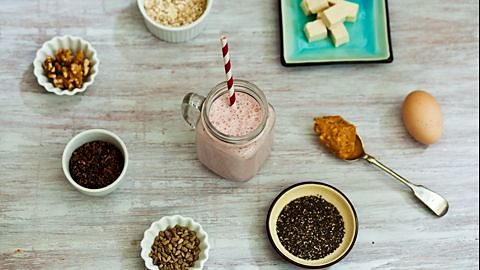How much protein is it safe to eat?

Once confined to sportsmen and women, high-protein diets are now commonplace – with Paleo, Atkins, Zone and Dukan advocating that people eat large quantities of fish, meat, eggs, nuts and cheese in order to lose weight. But how much protein is it safe to eat?
For weight maintenance it is recommended that 20 percent of your diet is protein, for weight loss up to 25 percent, and this is what our high-protein, low-GI diet is based on.
Protein can help with weight loss because it makes you feel fuller for longer and it has been linked to increasing the release of the gut hormone that triggers the 'stop eating' signal in the brain. But it is important to ensure you are getting all the other essential nutrients, in particular fibre, as a low-fibre diet can lead to complications such as constipation and vitamin deficiency.
However, some scientists suggest that a very high-protein intake could be linked to health risks. So how much protein is it safe to eat and how careful do you need to be when following a high-protein diet?
Why do you need protein?
Protein is in virtually every tissue of the body. At least 10,000 different proteins make you what you are, and protein is essential for your body's growth and repair.
Protein is created from amino acids, which the body makes either from scratch or by modifying other amino acids. Essential amino acids come from food, and animal protein delivers all the amino acids we need.
How much protein do you need?
Many people add protein to their diet using powders and shakes, but shakes can contain more than 45g of protein per bottle. So how much protein do you actually need each day, and how much is it safe to consume?
In the UK, adults are advised to eat 0.75g of protein for each kilogram they weigh, based on the Reference Nutrient Intake (RNI). So if you weigh 70kg (11 stone), you should eat about 52.5g of protein a day.
For an easy measure, one protein portion should be roughly the size of your palm. On average, men should eat 55g and women 45g of protein daily. That’s about two palm-sized portions of meat, fish, tofu, nuts or pulses.
But people find it easy to eat a lot more. Men and women in the UK eat about 45–55 percent more protein than they need each day, according to the National Diet and Nutrition Survey. Our high-protein, low-GI diet and recipes are designed to keep you within healthy limits.
Eating up to twice the current RNI for protein is generally thought to be safe, but when it comes to packing in excessive amounts of protein, nutritionist Dr Helen Crawley says: "There is no benefit to having very high protein intakes."
What can happen if you eat too much protein?
Some high-protein foods are less healthy than others due to additional fat and salt.
Processing excess protein can put pressure on the kidneys, with excess animal protein linked to kidney stones and, in people with a pre-existing condition, kidney disease. Some experts say too much protein may impact bone health and, according to the British Dietetic Association, excessively high levels of protein can cause side effects such as nausea.
Do you need supplements?

You should be able to get all the protein you need from a healthy diet.
Protein powders like whey isolate and foods marketed as being protein-heavy are now commonplace, and protein shakes can add substantial amounts of extra protein to the diet.
For sportsmen and women, protein helps muscle development and recovery after exercise, but some studies say that a healthy diet alone can provide the protein needed for muscle recovery.